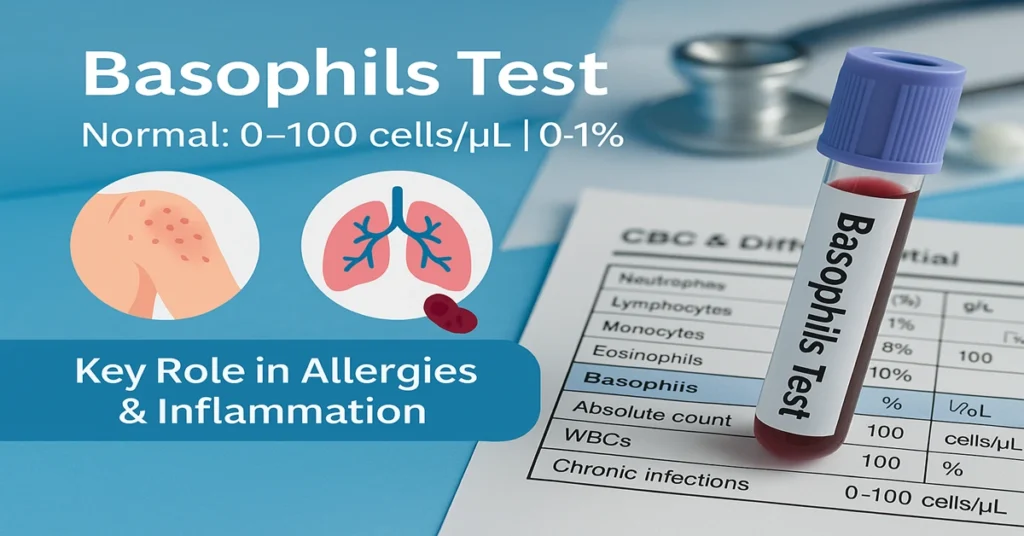What are Basophils?
Basophils are the rarest type of white blood cell (WBC), making up less than 1% of total WBCs. They belong to the granulocyte family and are identified by their large, dark blue or purple granules when stained under the microscope.
Despite being very few in number, basophils play an important role in allergic reactions, inflammation, and defense against parasites.
Where are Basophils Produced in the Body?
Basophils are produced in the bone marrow from hematopoietic stem cells. After maturing, they circulate in the bloodstream and can move into tissues during allergic or inflammatory responses.
Main Functions and Importance
- Release Histamine & Heparin: Trigger allergic symptoms like itching, swelling, and redness.
- Inflammation Role: Contribute to redness, itching, and swelling during inflammation.
- Parasite Defense: Work with eosinophils to fight parasites.
- Immune Regulation: Release cytokines to control immune response.
- Hypersensitivity Reactions: Involved in asthma, anaphylaxis, and other allergic conditions.
Causes of Low Basophil Levels (Basopenia)
- Early phase of allergic reactions (when basophils move into tissues)
- Hyperthyroidism (Graves’ disease)
- Severe infections
- Corticosteroid treatment
- Stress or acute trauma
- Ovulation or pregnancy (temporary/physiological basopenia)
Symptoms of Low Basophils
Low basophils usually do not cause direct symptoms but may reflect:
- Weakened inflammatory or immune response
- Underlying thyroid disorder
- Stress-related changes
Causes of High Basophil Levels (Basophilia)
- Chronic myeloproliferative disorders (e.g., chronic myeloid leukemia – CML)
- Hypothyroidism
- Allergic conditions: asthma, eczema, rhinitis
- Parasitic infections
- Ulcerative colitis (inflammatory bowel disease)
- Certain cancers
- Post-splenectomy (after spleen removal)
Symptoms of High Basophils
High basophils themselves may not cause symptoms, but signs of the underlying condition may include:
- Itching, hives, or rashes (due to histamine release)
- Wheezing or shortness of breath (asthma/allergies)
- Fatigue or abdominal discomfort (blood disorders, inflammation)
- Persistent sneezing or runny nose (allergic rhinitis)
Reference Range
(may vary by lab)
- Absolute Basophil Count: 0 – 100 cells/µL
- Percentage of Total WBCs: 0% – 1%
Sample Type
- Sample: Whole blood
- Tube Used: Lavender-top EDTA tube
Test Preparation
- No fasting is usually required.
- Inform your doctor about medications (especially steroids or thyroid medicines).
- Avoid allergy medication just before the test unless prescribed.
When to Consult a Doctor
- If your CBC shows abnormal basophil levels.
- If you have frequent allergic reactions or unexplained rashes.
- If you experience symptoms of thyroid imbalance or chronic inflammation.
- If you have ongoing asthma or immune-related conditions.
Key Terms Explained
- Basophils: Rare white blood cells involved in allergies and inflammation.
- Basophilia: High basophil count.
- Basopenia: Low basophil count.
- Histamine: A chemical released by basophils that causes allergy symptoms.
- Granulocytes: WBCs with granules (neutrophils, eosinophils, basophils).
~END~

